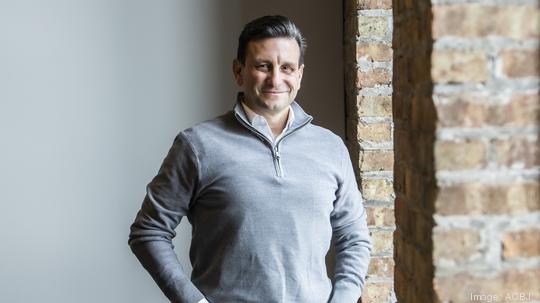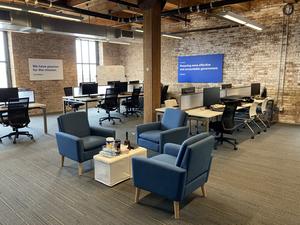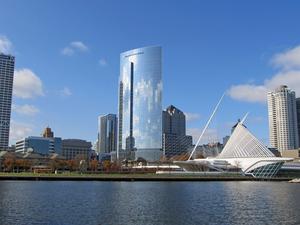
David Reeves has deep roots in Milwaukee. He was born and raised here, went to college here, met his wife here. But after living elsewhere for more than 20 years, it took a global pandemic to bring Reeves back to Milwaukee full time.
Reeves is the president of OpenGov, a Silicon Valley-based company that’s working to modernize government agencies nationwide with its cloud-based financial software. With Reeves at the helm, the company opened a Milwaukee-area office in June 2020 and recently announced plans to have 100 employees there within three years.
Now, Reeves is working to put Milwaukee on the national map for technology company CEOs, venture capitalists and other tech leaders. He sat down with the Milwaukee Business Journal to share his background, and to discuss his vision and approach to boosting the local tech industry.
This interview has been edited for clarity and length.
Tell us about your background and your connection to Wisconsin. "I grew up here, (was) born and raised here. I have a large Milwaukee family. I ended up getting into tech right out of college, though, so I lived in Chicago for five years, Boston for five years and Silicon Valley for 15... I did have a second home here in Milwaukee on the river. When the pandemic happened, I moved back full time. So after many years, I’m happy to be back home."
What influenced your decision to move back to Milwaukee full time? "We always liked it here, and family being close. I always felt bad about not living here. I was always a big advocate of Milwaukee. But having a house here and then starting to work from home here... I realized my wife and I really like Milwaukee a lot better. It's home.
"(My wife) went to Marquette... I went to (the University of Wisconsin-Milwaukee)... but I lived at Marquette’s campus with friends from Marquette... That’s how I met my wife — we lived across the street from each other.
"I have three kids. My oldest is a consultant for Accenture; he lives in Chicago. My second-oldest, Charlie Reeves, he went to (Miami University in Ohio) and he works for OpenGov, and my daughter is a sophomore at Marquette... So even though they all grew up in California or Boston, they all chose to go to school closer to home."
How did your decision to stay in Milwaukee affect OpenGov’s choice to open an office here? "That originally started about a year-and-a-half ago when I met (Marquette University president Michael Lovell) and I was talking to him about how I wish I could have had my office in Milwaukee. I’d put an office in Chicago, so we also have about 35 people in Chicago as well. But the only reason I put it in Chicago in the first place instead of Milwaukee is that there were no direct flights to Silicon Valley (from Milwaukee).
"But I was explaining that to (Lovell)... and he said, 'Well you know, you should consider hiring some Marquette kids, and if you did I might be able to kind of incubate a little office space for you.'
"We were rapidly growing and expanding our workforce and I was needing a new hub of where I was going to hire a lot of employees... So last June we started hiring a lot of Marquette students and they were working out really well. So what I found is that not only was it conducive to helping incubate so I could actually have an office space here, but the students — the recent grads — were actually doing quite well and performing quite well, so it turned out to be a really good business decision."
How did you “sell” the idea of Milwaukee to the rest of OpenGov’s leadership? “Silicon Valley has had a bit of a mass exodus due to Covid and allowing people to work where they want. What we’re finding is the concentration of talent ... is getting more dispersed.
“The CEO, Zac Bookman, and I for the last couple of years have been trying to limit employees in Silicon Valley because of high costs and taxes and things like that. When I first joined the company five-and-a-half years ago, it was a 100% Silicon Valley company, and I systematically made it much more regional. I want to get close to the customers, and Milwaukee is just a fantastic central location.
“I find that with the employees in the Midwest and Milwaukee in particular, it’s a pretty loyal workforce. Silicon Valley tends to have employees who are trying to find the right equity hit so they can get rich on stock, so unfortunately that creates a lot of transience in terms of the way they jump to different roles. Here, we thought we could build some longevity because we’re building a company for the long term.”
Can you talk about the work you’re doing to promote Milwaukee as a tech hub? “It started out where I was working with the (Milwaukee Tech Hub Coalition) … helping them build a (slide) deck that really spoke to what more tech employees would like. I know historically, all of the attraction in Milwaukee was around our manufacturing base. People talk about Harley (Harley-Davidson) and Johnson Controls and Milwaukee Tool, which are great companies, but they don’t really speak to people like myself from Silicon Valley — it’s a different way of thinking about it. So I started promoting that information around the opportunity for Milwaukee to venture capitalists.
“I’ve met with (Milwaukee Mayor Tom Barrett) about this, I’ve met with (Milwaukee County Executive David Crowley) about this, so it’s been meeting with the leaders like (Lovell), the head of Milwaukee School of Engineering, the vice-chancellor at University of Wisconsin-Milwaukee, and other business leaders ... Northwestern Mutual and the (MKE) Tech Hub Coalition, in particular; and the Greater Milwaukee Committee.”
What’s your motivation behind these efforts? “I think there’s untapped talent here, and with this new world we’re in where everyone doesn’t have to be centrally located always in Silicon Valley, I think there’s a tremendous opportunity.
“I believe we can build a tech ecosystem that can grow virally, and what that means is that if companies ... if I can get not only OpenGov to have a presence here, I think it could really instill confidence and be a motivation for other companies to consider Milwaukee. I think that is what it’ll take. And then when you have a bunch of companies here — even if it’s a regional headquarters, it doesn’t have to be the headquarters — I believe, personally, that that is how you start a tech ecosystem.”
What does Milwaukee need in terms of support to grow into a tech hub? “I think the primary thing that is needed is more interest from local politicians. If you look at Miami and Nashville, they have mayors who are really seeing what’s going on with jobs being relocated all over the place, and they’re seeing the opportunity. The Miami mayor (Francis Suarez), for example, he is really reaching out to Silicon Valley companies and firms and investors to really let everyone know that there’s a high desire for them to become a tech hub.
“I think we need more of that. We need our leaders — so I think the Tech Hub Coalition and Milwaukee 7 and the Metropolitan Milwaukee Association of Commerce and the Greater Milwaukee Committee — I think they need more of a united front externally. I think we talk to Milwaukee a lot about becoming a tech hub and selling ourselves on it, but I think a lot of the selling needs to happen to the investors, the venture capitalists and the people who actually have tech companies — you know, CEOs. So more direct outreach, is what I would argue.”
In terms of trying to recruit other companies to come to Milwaukee, are you reaching out to your contacts in Silicon Valley? "Yes. I have a lot of investors and venture capitalists that I’ve worked with…
"The investors, only because they can touch a lot of entrepreneurs. So if you’re a venture capitalist who has invested in 50 companies, they have the ability to — as the CEOs of the companies are looking for a headquarters or regional office or somewhere outside of Silicon Valley — say, 'Hey, have you looked at Milwaukee?' is something that I would like. In the past, Raleigh, North Carolina, or Austin might be the ones that get mentioned because there’s a bit of a tech presence there, and I’m trying to get us on the map for that."






